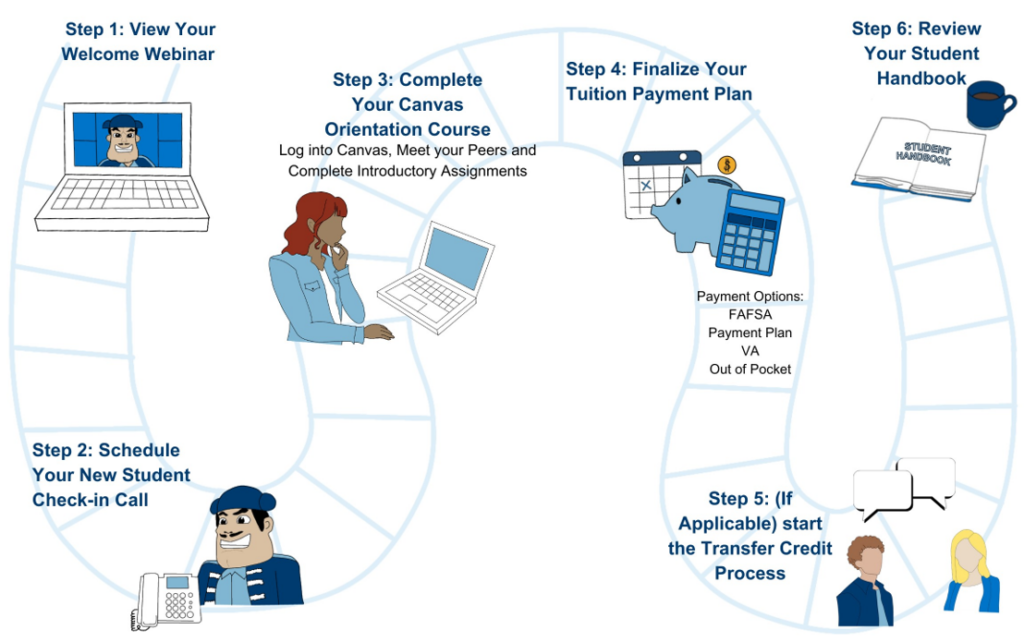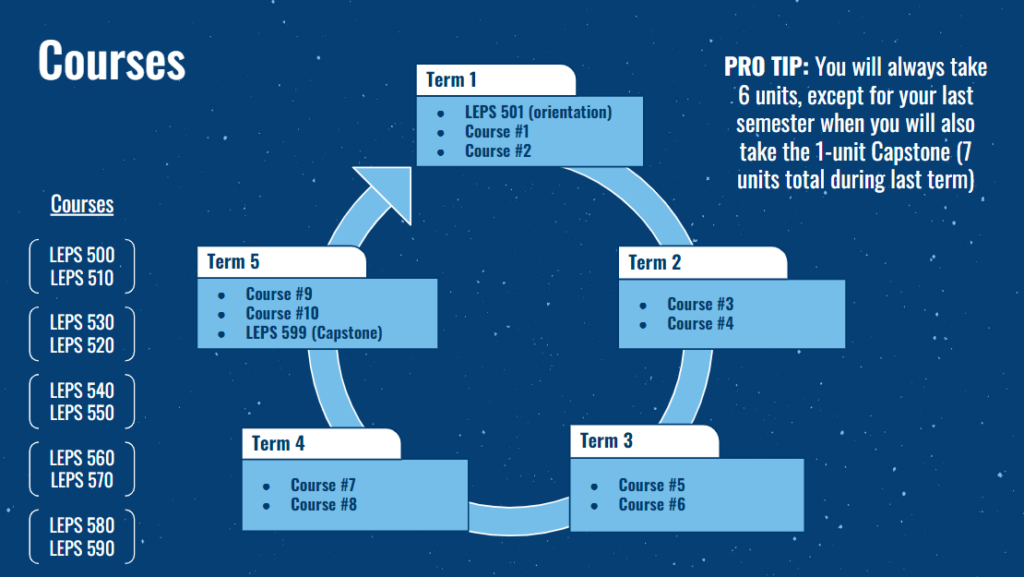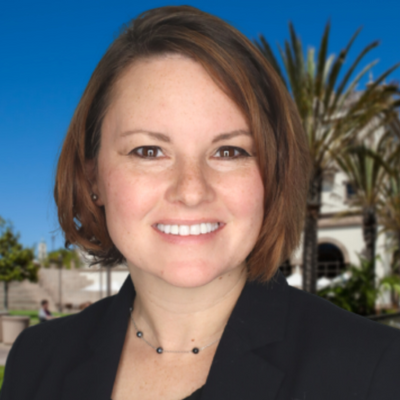Student Success Center
MS in Law Enforcement and Public Safety Leadership
Welcome!
As an online student, most of your interactions with the university will be done through various websites. For example:
- You’ll use your USD Email Address for all university-related communications.
- You’ll use Canvas for all of your coursework and assignments. See Canvas Tips and Tricks page.
- You’ll use My.SanDiego.edu for tuition payments and to access most campus resources.
- You’ll use this site, your Student Success Center, to get specific information about textbook information, deadlines, and more!
- If you identify as alumni, visit our Alumni page to remain engaged.
Your Program Coordinator
Katie Gonzales
(619) 928-4691


COMPLETE YOUR MANDATORY NEW STUDENT CHECKLIST
Our number one priority is you! Our team has prepared a checklist of items that will set you up for success and clarify all action items as a new student. After you are enrolled for your first term and receive a confirmation email from a member of our team, please complete and review all of the following before classes start.
1. View Your Mandatory New Student Welcome Webinar
This webinar will go over a comprehensive look at your program and what to expect as an online learner including resources and tips for success. Each webinar should last around 30-40 minutes. Once you have been registered for classes and receive a confirmation email from our team, you will be emailed the link to schedule your welcome webinar to your @sandiego.edu email address.
2. Schedule Your New Student Check-in Call
In this call, you’ll “meet” a member of your Student Success Team for your program. This will be a chance for us to answer any additional questions you have before you start your first term. Please be sure to have any Canvas-related, program-related, or finance-related questions prepared. After attending the Welcome Webinar, you will be prompted to schedule your call using a scheduling link.
3. Complete Your Canvas Orientation Course - Due January 2, 2026
Once you have been registered in your classes, you will be able to access your New Student Orientation Course on Canvas within 4 hours. When accessing Canvas, please make sure to use Firefox or Chrome as your browser.
The New Student Orientation course is designed to help you navigate your way around your course's layout prior to beginning your first class. You will learn where to find the syllabus, course schedule, assignments, and discussion boards.
Your Orientation is mandatory, and must be completed before the first day of class—so we encourage you to get started! Please plan to spend about 6-8 hours completing the Orientation course. You can move through the Orientation at your own pace, so schedule your time accordingly.
Looking for assistance?
4. Finalize Your Tuition Payment Plan
We recommend that students start this planning early as some funding sources can take some time to process. Tuition payments should be completed in full by the first day of the semester. Visit the "Tuition and Payment Methods" section for more information.
5. (If Applicable) Start the Transfer Credit Process
Students in the MS-LEPSL program may be eligible to transfer in previous coursework to satisfy some degree requirements and graduate on an accelerated timeline. See the "Student Resources" section for a list of eligible programs and more information.
6. Review your Student Handbook
Please make sure to review your student handbook prior to the first day of class, and reference it as needed throughout your program. The handbook is where you can find information on academic expectations, drop and refund policy, technology requirements, curriculum, frequently asked questions, and more.

IMPORTANT DATES
Below is a list of significant dates regarding the registration process, payment deadlines, and other important academic and program deadlines.
Fall 2026 Dates and Deadlines
| Important Dates | Date |
|---|---|
| Registration Opens | June 29, 2026 |
| Application Deadline | July 31, 2026 |
| Registration Deadline | August 14, 2026 |
| Orientation Course Due Date | August 28, 2026 |
| Last Day to Drop with 100% Tuition Refund* | August 31, 2026 |
| Payment Due Date | September 1, 2026 |
| Semester Begins | September 1, 2026 |
| First Course Start Date | September 1, 2026 |
| Last Day to Drop with 95% Tuition Refund/ Drop Deadline* | September 4, 2026 |
| Last Day to Withdraw from Course A | September 28, 2026 |
| First Course End Date | October 19, 2026 |
| Second Course Start Date | October 20, 2026 |
| First Course Final Grade Submission Due Date | November 2, 2026 |
| Last Day to Withdraw from Course B | November 16, 2026 |
| Second Course End Date | December 7, 2026 |
| Semester Ends | December 7, 2026 |
| Second Course Final Grade Submission Due Date | December 21, 2026 |
Spring 2026 Dates and Deadlines
| Important Dates | Date |
|---|---|
| Registration Opens | November 3, 2025 |
| Application Deadline | December 1, 2025 |
| Registration Deadline | December 15, 2025 |
| Orientation Course Due Date | January 2, 2026 |
| Last Day to Drop with 100% Tuition Refund* | January 5, 2026 |
| Payment Due Date | January 6, 2026 |
| First Course Start Date | January 6, 2026 |
| Last Day to Drop with 95% Tuition Refund/ Drop Deadline* | January 9, 2026 |
| Last Day to Withdraw from Course A | February 2, 2026 |
| First Course End Date | February 23, 2026 |
| Second Course Start Date | February 24, 2026 |
| First Course Final Grade Submission Due Date | March 9, 2026 |
| Last Day to Withdraw from Course B | March 23, 2026 |
| Second Course End Date | April 13, 2026 |
| Semester Ends | April 13, 2026 |
| Second Course Final Grade Submission Due Date | April 27, 2026 |
Summer 2026 Dates and Deadlines
| Important Dates | Date |
|---|---|
| Registration Opens | March 2, 2026 |
| Application Deadline | April 3, 2026 |
| Registration Deadline | April 17, 2026 |
| Orientation Course Due Date | May 2, 2026 |
| Last Day to Drop with 100% Tuition Refund* | May 4, 2026 |
| Payment Due Date | May 5, 2026 |
| Semester Begins | May 5, 2026 |
| First Course Start Date | May 5, 2026 |
| Last Day to Drop with 95% Tuition Refund/ Drop Deadline* | May 8, 2026 |
| Last Day to Withdraw from Course A | June 1, 2026 |
| First Course End Date | June 22, 2026 |
| Second Course Start Date | June 23, 2026 |
| First Course Final Grade Submission Due Date | July 6, 2026 |
| Last Day to Withdraw from Course B | July 20, 2026 |
| Second Course End Date | August 10, 2026 |
| Semester Ends | August 10, 2026 |
| Second Course Final Grade Submission Due Date | August 24, 2026 |
* During the first semester of enrollment, any tuition refund amounts will not include the non-refundable enrollment deposit amount (5% of tuition).
Download a pdf of your academic calendar
Upcoming Events
Don't miss out on connecting with your University of San Diego global community through a variety of events - featuring academic workshops, cultural celebrations, networking events, and more. There’s something for everyone!
Class Registration Directions
You have most likely already filled out an Enrollment Agreement, which enables our team to register you for classes each term. No further action is required on your part.
If you are not able to register for both of your courses in a given term, please contact your program coordinator immediately. This often happens for students who have transfer credit or need to take a leave of absence.
Textbook information
Students are required to have their textbooks on hand by the first day of class. Unless otherwise specified, students may select any vendor they prefer (such as Amazon.com, Half.com, Alibris.com, etc.) to purchase their course materials. In the event a specific vendor is required, it will be specified in the course materials list. The best way to ensure that you have the correct book is to search by the ISBN number(s) listed on the book list.
Physical copies of books are not on hand at the USD Torero Store. The USD Torero online store does offer price comparisons for different online vendors for some books.
Although all textbooks for all courses are listed, students only need to purchase the items for the classes they are taking for the semester.
Digital Inclusive Access (IA) - Integrated VitalSource Textbooks
If your course is indicated to have a "Digital Inclusive Access" textbook, you do have the option to use the integrated Vitalsource e-textbook without needing to purchase a textbook through an outside vendor. For more information, view the "Digital Inclusive Access" FAQs document.
- Students are able to access the e-textbook directly in the course without worrying about purchasing the wrong version or textbook!
- If your course is indicated as using “Digital Inclusive Access” on the textbook list, please note that you must opt-out within the first 7 days of each course to avoid being charged for the guaranteed-lowest price textbook.
- If you do intend to use “Digital Inclusive Access”, no further action is required after you create a Vitalsource account.
- No refunds can be issued once the textbook charge has been assessed.
By using Vitalsource e-Textbooks, students are able to use study tools in Bookshelf such as highlighting, printing limited pages/chapters, sharing notes, and using the Bookshelf CoachMe tool to test their learning while they read.
PAYing for your program
Tuition at USD is billed per semester, not per course. Payment (or enrollment in an official USD payment plan) is always due by the first day of the semester. Students may not carry balances from one semester to the next.
Accounts with outstanding balances after the official payment due date may be subject to course cancellations/removal or a student account hold during the semester; related holds can prevent upcoming registration, graduation, or obtaining transcripts.
Remember: tuition is always due by the first day of each semester.
Tuition amounts shown on this website, or in other university publications or web pages, represent tuition and fees as currently approved. However, the University of San Diego reserves the right to increase or modify tuition and fees without prior notice and to make such modifications applicable to students enrolled at USD at that time as well as to incoming students. In addition, all tuition amounts and fees are subject to change at any time for correction of errors.
Program Tuition
Once you have been registered for your courses, your student account will reflect the appropriate tuition costs according to your program. Payments not received by the deadlines are subject to late fees. Your program’s tuition is the following:
- Per Unit (classes are typically 3-units) = $729
- Per Semester (assuming 6-units per semester) = $4,374
- Total Program Cost (including 5 semesters) = $22,599
Students who need to re-take or withdraw from a course may need to pay additional fees according to the Refund/Drop Deadline policies listed in your Student Handbook.
If you have any questions about your Student Account, please reach out to the Torero Hub by submitting their inquiry form or phone at 619-260-2700. All costs and fees are subject to change and are based on the academic year of enrollment.
ENROLLMENT DEPOSIT
Please note that students in USD’s MS in Law Enforcement and Public Safety Leadership program are required to submit a one-time 5% non-refundable deposit. The payment will automatically be applied to your first-semester tuition.
Requested Tuition Discount
USD supports a public safety discount to LEPSL students who are active members in any of these partner associations:
- Arizona Association of Chiefs of Police (AACOP)
- Association of Orange County Deputy Sheriffs (AOCDS)
- California Peace Officers Association (CPOA)
- California Police Chiefs Association (CPCA)
- FBI-LEEDA
- FBINAA
- Fraternal Order of Police (FOP)
- National Association of Women in Law Enforcement (NAWLEE)
- National Tactical Officers' Association (NTOA)
- Police Executive Research Forum (PERF)
- Riverside Sheriffs Association
View the list of accepted documents that qualify for a tuition discount of $50 off per academic unit ($679 per unit after discount) and submit your request for discounted tuition. You will be notified by a member of our team if your request was approved or if further documentation is needed.
Refund Policy
Students will be registered for their prescribed courses each semester. All courses must be dropped prior to the first day of the semester to receive a 100% tuition refund* and within the first three days of the start date of the semester to receive a 95% tuition refund*. No refund (reversal of tuition) will be provided after the third day of the semester for any class. *During the first semester of enrollment, any tuition refund amounts will not include the non-refundable enrollment deposit amount (5% of tuition).
DEGREE PROGRESS and COMMENCEMENT
DegreeWorks
You can track your progress toward earning your degree using the Degree Works feature in your MySanDiego student portal. Degree Works shows you which courses you have completed, grades, cumulative GPA, any outstanding graduation requirements, and more!
To access Degree Works:
- Log in to your MySanDiego student portal.
- Under the “Torero Hub” tab, click on “My Academics.”
- On the right-hand side under “My Academic Resources”, click on “Degree Works.”
Petition to Graduate
Submitting your petition to graduate is a requirement for every student. About a semester before your final term, you will be reminded by your Program Coordinator to submit your petition to graduate. Once completed, your Academic Coordinator will review your academic record and contact you if there are any outstanding requirements or issues.
Commencement timing
If you are planning on participating in the commencement ceremony (which means walking in your cap and gown here on campus), you will be invited to come to the University of San Diego to participate in the ceremony. Commencement details and information will be sent from your Student Success Team around the month of February.
- There is only one commencement ceremony each academic year in May.
- Fall and Spring graduates will be invited to the commencement ceremony the May after they graduate.
- Summer graduates will be invited to the commencement ceremony the May before they graduate.
Diploma Details
The Registrar will process their final audit of the degrees 6-8 weeks after grades are posted for your final semester. Once the degree is conferred in the system, the Registrar will order your diploma from the vendor and the vendor will send it to you directly to the address that was listed on your petition to graduate.
If your mailing address changes after you submit your Petition to Graduate, please notify the Graduate Records office at (619) 260-2217 or [email protected].
You will receive a digital diploma to your @sandiego.edu email address once your degree has been officially conferred.
You will also receive a physical diploma. Mailing time is an additional 6-8 weeks from the date of order, and you will likely receive your diploma in the mail in 3-4 months after you have completed your degree requirements.
Course Details
program requirements
Completion of all the courses in the prescribed curriculum of ten 3-unit courses and the 1-unit Integrative Capstone course, for a total of 11 courses and 31 units, is required to successfully complete this program.

Course Titles and Descriptions
Contemporary Issues in Law Enforcement and Public Safety (LEPS 500)
This course examines cutting-edge issues facing law enforcement and public safety including: evolving technology, legal standards regarding the use of force, officer health and wellness, UAVs, facial recognition, correctional realignment, drug policy changes, bail reform, records disclosure, and more. These issues are changing the landscape of law enforcement faster than ever before; this course will help law enforcement leaders proactively prepare for their agencies to thrive in this dynamic landscape.
Communication Skills for Law Enforcement Leaders (LEPS 510)
From interpersonal communication with colleagues and citizens to formal written reports to working with the media, this course studies all of the different ways law enforcement leaders need to communicate to be successful. The course introduces and develops a series of communication skills essential for someone leading a modern law enforcement department.
Best Practices In Community Engagement (LEPS 520)
This course looks at best practices regarding how individuals in law enforcement engage both broadly with the community and with key stakeholders. This course specifically zeros in on these aspects of communication in the modern climate of increased transparency and collaboration. Building from real case studies, students will complete this course with an understanding of how to appropriately position their agencies in the national dialogue about policing in the contemporary climate, being leaders in a progressing industry, and what it means to be a changemaker in the field of policing.
Public Safety Law In a Dynamic World (LEPS 530)
In an era where evolving technology is outpacing the law, this cutting-edge course helps provide direction and answer questions around the legal complexities of using law enforcement technologies and other contemporary legal issues. The course looks at right-to-privacy and 4th amendment cases that are guiding legal precedents regarding smartphones, UAVs, BWCs, Brady issues, DNA evidence, cyber crime, terrorism, peace officer records release, and transparency legislation. The course features hypothetical scenarios in which students make leadership and mission decisions broaching legal questions where there is no clear correct legal answer.
Organizational Leadership for Law Enforcement (LEPS 540)
How do law enforcement and public safety professionals lead under stress, in environments of change, and in the modern social and political climate? Strong leadership is crucial in law enforcement organizations; from officer safety, to thriving teams, to organizational success or failure, the stakes are high day in and day out. Leadership is a broad and diverse toolkit that can, and should, be understood and applied differently by individuals and organizations. Throughout this course, students will be exposed to practical and application-based examinations of organizational models and leadership theories. Designed to create immediate payoff with real-time and actionable lessons, the course uses a variety of case studies from law enforcement, corporate America and the military to present a holistic look at leadership, ethics, and best practices in modern law enforcement and public safety organizations.
Data Fluency and Analysis for Law Enforcement Leaders (LEPS 550)
In today’s law enforcement and public safety field, leaders need to be able to justify resource allocation decisions, present data-driven initiatives and demonstrate success and failure with sound data and evidence. This course nurtures a contemporary and critical understanding of the importance of crime data and related evidence to maximizing both ethics and efficacy within agencies. Honing in on intelligence-led, evidence-based, data-driven policing, students will learn how to effectively present accurate, detailed crime data and related evidence for key stakeholders.
Effective Leadership in Modern Public Safety: Theory, Concepts, and Application (LEPS 560)
This course examines best practices for effective and impactful leadership in the dynamic, contemporary world of public safety. Relevant leadership theories will be coupled with real-world case studies from law enforcement, the military, academia, and the private sector to present a well-rounded analysis of the dynamic concept of leadership. The course emphasizes self-reflection, tangible strategies, and practical skill building to nurture immediately applicable leadership proficiencies that will support today’s law enforcement and public safety personnel to thrive in a dynamic and demanding environment.
Public Policy Innovation (LEPS 570)
How do agencies carry out reliable public policy research? Which resources do they invest in and why? Are the programs in place working? How can any given law enforcement leader be an effective, critical consumer of research, evidence, and best practices? This course looks at how to make good policy decisions, how to involve key stakeholders, and how to create and communicate policy. Nurturing practical research skills for law enforcement leaders, students will complete a project in which they are placed in groups to collectively write an MOU for a gang or human trafficking multiagency task force. Working each week to contribute to the document, they produce a real MOU by the end of the course; something typically high-ranking individuals and/or those in specialized assignments have the opportunity to do.
Law Enforcement Management and Conflict Resolution (LEPS 580)
A deep and applicable understanding of emotional intelligence, human resources, and essential skills for managing workplace conflict is key to leading successfully. In this course, students will develop skills that are essential to effective dispute resolution. These skills will be introduced, developed, and applied to conflicts between individuals, within small groups, and throughout organizations. At its core, this is an ethics-centric leadership and management course that addresses the unique dynamics of criminal justice agencies. Navigating contentious issues and developing and executing effective, positive resolutions requires an approach that emphasizes human dignity and both personal and professional integrity throughout the process.
Budget and Finance for Law Enforcement Leaders (LEPS 590)
Would you know how to create and present a budget if asked to do so? Budget and finance is an area in which many new to a command staff position feel they need additional training. And with the increased emphasis on evidence-driven rationales for budgetary decisions, all law enforcement leaders need to have a robust understanding of budgeting, contract negotiation, finance, and staffing/resource allocation. This course will expose students to different types of budget models and how they function in a public safety environment. Key learning concepts include performance-based, line-item and zero-based budget models, along with best practices for finding, writing and securing grants that are often key to organizational goals.
Integrative Capstone* (LEPS 599)
In the final course of the program sequence, students create an online portfolio to showcase what they’ve learned throughout the program. In what could be described as a ‘resume on steroids’, this portfolio contains a compilation of exemplary projects, term papers, presentations, and skill-based exercises that were completed throughout the program. The creation of the capstone project requires students to identify and critically reflect on the major program themes and what they’ve learned in the program. The reflection and the portfolio itself are both invaluable assets for career advancement. Prerequisites: LEPS 500, LEPS 510, LEPS 520, LEPS 530, LEPS 540, LEPS 550, LEPS 560, LEPS 570, LEPS 580, and LEPS 590.
*Note: all electronic portfolios have password protection and other security options to keep information secure.
Previous alumni and current LEPSL faculty have prepared a "Capstone Tips and Tricks" document to better prepare you all to succeed in the course.
Student Resources
This list is helpful resources that will set you up for success. Haven’t written in APA formatting since your undergraduate program? We’ve got you covered! Want to know what type of computer you will need? No problem. We have listed helpful resources below.
Academic Requirements and Resources
Technical Requirements
You must own or have unrestricted access to a computer for this program. A fast Internet connection is also mandatory.
Courses will utilize a variety of technologies and multimedia. To complete course activities and to access course content, please verify that you have the following technologies and plug-ins available:
- Browser Plug-ins – Windows Media Player, QuickTime, Flash, Shockwave, Adobe Reader, and Java.
- Mozilla Firefox is the recommended browser.
- Microsoft Office is required. If you are using Office 2003 or earlier, download and install the Microsoft Office Compatibility pack.
- Speakers or headset – to listen to multimedia.
- Webcam – for recording video.
- Email – To contact your faculty.
- High-speed internet connection strongly encouraged (DSL or better)
Graduate Writing Expectations and Tips
All citation formats are permissible, so long as the presentation is professional in nature. If you want additional writing support, we recommend Purdue Online Writing Lab (OWL@Purdue). In addition to general writing support, the website includes a special section dedicated to APA formatting guidelines.
Another helpful writing resource is the School of Leadership and Education Sciences (SOLES) Graduate Student Writing Center. Enrolled students can submit assignments for review by a writing professional.
Online Learning Strategies
View our virtual workshop, "Online Learning Unlocked: Strategies, Resources & Collaboration," which will equip you with practical knowledge and skills to apply tangible strategies to learn online in an asynchronous environment throughout your Master's Degree!
LEPSL Academic Standards for Artificial Intelligence (AI)
With the rise of AI writing assistants, students must ensure that they use this new technology ethically and honestly. LEPSL studens are encouraged to consult the LEPSL Artificial Intelligence document for guidance.
Download Microsoft Office 365 (Free for USD Students)
Students at the University of San Diego are able to download Microsoft Office 365 for free! If you don’t have it already, you can download the Microsoft Office 365 suite using your USD student email.
Accessibility Student Resources
Students may request formal accommodations from the Disability and Learning Difference Resources Center and may also use the following accessibility tools:
Accessibility Student Resources
Tailored Support for Neurodiverse College Students Webinar Recording
External Tutoring Resource
USD does not offer subject-specific tutoring resources, so students who are looking for tutoring support are encouraged to identify a tutor using Wyzant.com. Please note that Wyzant is not a USD-managed resource, so use them at your own discretion.
University Resources
TimelyCare - Telehealth for USD Students
TimelyCare is a provider of 24/7, no-cost telehealth services for USD students to address common conditions that can be safely diagnosed and treated remotely. TimelyCare services are available at no cost to the student. Services include:
- Live and on-demand self-care sessions (yoga, breathing, stretching)
- Access to on-demand counselors for emotional health support
- Access to schedule a session with a licensed counselor (up to 12 times per year)
- View the Nurturing Balance Webinar Recording to learn about more resources
Economic Resources List
USD's Case Management team has compiled a list of on-campus (local to San Diego) and national economic resources to help students find assistance with a variety of life aspects such as housing, food, mental health, parenting, etc. If you have a need or concern that isn’t addressed by the resources included in this list, please reach out to your Program Coordinator for further assistance. Based on the support, we may refer you to schedule an appointment with a case manager.
University Sustainability Resources
USD's Office of Sustainability has a lot of resources available to help the USD community reduce its carbon foot-print and find ways to increase sustainable practices.
The Office of Sustainability website is a great resource that contains more tips and a Data Dashboard detailing USD's progress.
View this Sustain-A-Tips video
Campus Partner Email Opt-Out
Get too many emails? Follow our email opt-out guide to optimize your USD email experience.
On-Campus Resources
If you live local to San Diego, the USD Campus is available to all of our students and includes these additional resources. Even if you far away from campus, many offices offer remote options.
identity resources
Military Student Resources
USD provides student-focused services to all USD military-connected students, including student veterans, active-duty, dependent children, and spouses.
- Get started by requesting your Request to Certify each semester.
- Explore Military Scholarship Opportunities.
- Join the Student Veteran Organization .
- Leverage the partnership between USD and 50strong that brings together employers and veterans.
- Upon graduation, connect with the Alumni Veteran Network
First-Generation Student Resources
USD welcomes first-generation college and first-generation graduate students. Please view the resources below to connect with your first-gen peers!
- Visit the USD First-Generation website.
- FirstGen Forward with Annual Free & Virtual Symposium.
- Instagram accounts: @usd_fgsa and @usdfirstgen.
- Contact the First-Gen Action Team at [email protected]
- View the USD First-Generation Student Guide.
- Sign up for the First-Gen Network Newsletter (sign up here).
- Facebook account: USD First-Generation Students.
- Watch the First Gen Wellness Webinar Recording.
- View the First Gen alumni and student panel recording.
Student Parent Resources
Many students who attend USD are also parents. USD offers the following resources:
- Join the Parenting Student listserv: [email protected]
- Pregnancy Resources: Several USD Centers are available to accompany pregnant students as they navigate pregnancy while a student at USD.
- Financial Aid: The university’s Financial Aid Offices can help you qualify for additional loans to cover medical expenses and child care.
- Childcare Solutions: USD supports many resources for finding infant and child care to meet your family’s needs.
- View a recording of our Student Parent Time Management webinar.
DACA/Undocumented Student Resources
Please view the USD information trifold for current and prospective students. It is also available in Spanish.
Review the Higher Ed Immigation Portal website which includes some useful information and connections to the undocumented student community, state and national policies, information on graduate and professional school access, retention and success. It is a living document that will be updated regularly and include any new resources that campuses and organizations develop.
TRANSFER CREDIT & cREDIT vALIDATION
Getting Started & Policies
Transfer credit is the process of using credits from a different Master's level degree program to replace a LEPSL course in your program. To get this process started, we need a copy of your academic transcript (typically already included in your application file).
Credit validation is the process of offering graduate level extension credits for work completed in select trainings, conferences, workshops and other professional development programs. Similar to transfer credit, these units could replace select LEPSL courses in your program through using the transfer credit process, but credit validation will generate the transcript you need to start the transfer credit process once an enrollment fee is paid.
If you have completed any of our approved programs, you may be eligible for transfer credit. Please use the links provided below to start the process.
Important notes:
- To be eligible for transfer, the equivalent course must (1) not have been counted towards another degree, (2) must reflect a grade of "B" or higher, and (3) the credits must have been earned within the last five years from an accredited university. No guarantee of transfer is made until all signatures are secured and the credit is verified through an official transcript. All transfer credit requires Academic Director approval.
- Students need to have transfer credit submitted, evaluated, and approved before the end of the first course offered in their first semester. Any requests for transfer credit after the first course will not be permitted. We recommend working with your Program Coordinator to have your transfer credit processed before the start of classes to ensure a smooth scheduling experience.
- Using transfer credits may affect your financial aid or military/veteran benefits package. Financial aid requires at least 4.5 units of enrollment in a term, and taking one course (3 units) puts students below the part-time 4.5 unit FAFSA threshold.
- Concurrent enrollment in Command College or FBINA in the LEPSL program is not permitted. Concurrent enrollment in SLI, FBILEEDA, SMIP, or SDRLI is permissible if you have the bandwidth to do so, however, you will NOT be able to use that training as transfer credit since all transfer credit must be submitted, evaluated, and approved before the end of the first course offered in their first semester.
Programs Available for Transfer Credit (No Credit Validation Required)
- FBI National Academy (graduate classes only completed at University of Virginia in the last 5 years)
- Marine Corps University’s College of Distance Education and Training (CDET CSCDEP)
- 8901 Theory and Nature of War + 8902 National and International Security Studies = LEPS 560 Organizational Change and Theory for Law Enforcement (3 units)
- 8903 Operational Art + 8906 MAGTF Expeditionary Operations = LEPS 540 Organizational Leadership for Law Enforcement (3 units)
- Other graduate-level college coursework completed in the last 5 years from a regionally accredited university. Note that if the course credit has already been applied to another graduate degree or certificate, it is not eligible for transfer into the MS-LEPSL program (No “double-dipping” of units).
- If you are unsure if any units could be used, reach out to your Program Coordinator to inquire further. We will need a copy of any course syllabi, course descriptions, and an unofficial transcript of the respective courses to seek initial approval.
If you have not already submitted your official transcripts in your MS-LEPSL application, please make sure to work with your Enrollment Advisor to order your official transcript - which is required in order for us to process the transfer credit request with the USD Registrar's Office. Once received, you should receive a DocuSign request from our office to complete the necessary paperwork.
Programs Available for Credit Validation
The MS-LEPSL program has approved a number of law enforcement professional training programs for a process called credit validation, which allows us to assign graduate academic credit that can then be transferred into the program. There is a fee for this service, which is performed by USD’s Division of Professional and Continuing Education.
The credit validation process will ask for you to create a new account/application on the Continuing Education website. This step creates an account separate from your USDOne Graduate profile. If you experience any difficulties with the application or website, please contact the Enrollment and Student Services team at 619-260-4585.
The following programs are eligible for credit validation.
- Senior Management Institute for Police (SMIP)
- FBI-LEEDA Trilogy
- CA POST Command College
- San Diego County Regional Leadership Institute (SDRLI)
- CA POST Sherman Block Supervisory Leadership Institute (SLI)
If your credits have been approved for credit validation, we will use the transcript to then officially initiate the transfer credit process.
Online Student Handbook
The handbook is where you can find information on academic expectations, drop and refund policy, technology requirements, curriculum, frequently asked questions, and more.
Graduate Student Code of Rights and Responsibilities
It is the policy of the University of San Diego to adhere to the rules and regulations as announced in this brochure or other University Publications. The University nevertheless hereby gives notice that it reserves the right to expand or delete or otherwise modify this online publication whenever such changes are adjudged by it to be desirable or necessary. Changes will be made periodically as needed.
Canvas @ USD
In your program, you can think of Canvas as your virtual tool to share information with professors and peers. You will use Canvas to access your course content, find course syllabi, review your assignments, and more. Be sure to use your USD credentials to log in. If you have any difficulty logging into your course, be sure to contact ITS at (619) 260-7900 or [email protected].
Netiquette Guidelines
The concept of netiquette covers proper communication online. Read our guidelines to help cultivate a supportive and productive online environment.
your partners toward success
At USD, you join a community of individuals who are all committed to one common goal: your success. As you familiarize yourself with your team, take the opportunity to virtually meet and connect with the resources available to you as a student. Click on the profiles below to learn more about each office or staff member and watch a brief video about their role in supporting you through graduation.















USD Quick Links
- USD Directory (For Faculty or Staff Contact Information)
- Torero Hub
- Health and Wellness
- SOLES Graduate Writing Center
- Military and Veterans Program Center
- Disability and Learning Difference Resource Center
- Copley Library
- Career Development Center
- Campus Recreation (Remote and On-Campus Classes Offered)
Career and professional resources
Whether you're hoping to find a new job or earn a promotion, USD has a wealth of resources available to prepare you for your dream role.
Frequently Asked Questions
How much is my tuition?
Tuition for the MS-LEPSL program is $729 per unit.
With a total of 31 units, the full cost of tuition for the program is $22,599.
Tuition amounts shown on this website, or in other university publications or web pages, represent tuition and fees as currently approved. However, the University of San Diego reserves the right to increase or modify tuition and fees without prior notice and to make such modifications applicable to students enrolled at USD at that time as well as to incoming students. In addition, all tuition amounts and fees are subject to change at any time to correct errors. Please note that the displayed tuition covers only the cost of courses, and additional expenses such as books and other fees are not included.
How many units is my program?
The MS-LEPSL program is a total of 31 units.
Students will enroll in two prescribed courses each semester for a total of 6 semester units. Students must register for the additional 1-unit capstone course during their final semester in the program.
Is this a full-time or part-time program?
The University of San Diego considers 9 or more units as full-time student status. Your program is designed to be part-time, and students enroll in just 6 units per semester. There is no full-time option for this program.
How do I register or drop classes?
All students are manually enrolled each semester by the USD Student Success team. If you are not able to enroll for a term or if you need to drop your courses, it is your responsibility to notify your Program Coordinator. All students will be held to the respective drop deadlines and refund schedule detailed in your Student Handbook.
Where do I find my bill and how do I pay it?
Login to your my.sandiego.edu student portal. Under the “My Student Account” tab, review the tutorials for directions on how to view and pay your bill, set up a payment plan, and enroll in eRefund (Direct Deposit). View the “Tuition and Payment Methods” on your Student Success Center for further details.
Where can I view my final grades?
Log into your my.sandiego.edu student portal and navigate to the “Torero Hub” section on the sidebar. Click on the “My Academics” tab and locate the “View My Grades” link in the top-middle section. Alternatively, you can view your program progress at a glance using the “Degree Works” link.
If you notice a grade inconsistency between Canvas and your MySanDiego portal, please email your instructor to verify what the final grade should be. Your instructor has the ability to update the posted grade.
How do I see my degree plan and track my progress?
Log into your my.sandiego.edu student portal and then use the “Degree Works” link to view your degree audit.
You can find the “Degree Works” link in the Torero Hub under the “My Academics” page. If you are interested in requesting a tailored degree plan, please email [email protected].
What if I need to take a break from courses?
If you need to take time off from your program, please email your Program Coordinator or the Student Success team at [email protected]. Since you have submitted your enrollment commitment, our team will automatically register you in courses each term unless you have previously notified the team about taking a break.
Is on campus housing available for part-time and online degree students?
On campus housing options may be available only for full-time on campus students. Housing is very limited for graduate students. We highly encourage part-time and online students seeking housing in San Diego to leverage the resources below including the USD Off-Campus Housing website.
Two of our most popular resources are the Off-campus Housing Facebook page where we list housing options, and our Roommate Finder List.
Please note that the University of San Diego does not research, vet or endorse any of the off-campus apartments listed on our website or the off-campus housing Facebook page. The listings provided are posted by third parties who are not affiliated in any way with the University of San Diego. Students must contact the manager of each apartment building directly regarding questions, current pricing and availability.
Is there any required time that I need to login to my online course?
No, online degree programs are 100% online and asynchronous so that you will never be required to log in during a specific date or time.
There may be supplemental synchronous opportunities such as Office Hours with your instructor, virtual workshops or on campus events that you may participate in.
How do I order transcripts?
To order your official, unofficial, or e-transcript(s), view the transcript ordering options page. Otherwise, you can view unofficial/order official transcripts through your MySanDiego portal. Under the “Torero Hub” sidebar option, click on the “My Academics” page, then click on “Request Official Transcript” under the “My Classes” section.
When will I get my diploma?
Congratulations on finishing your program! Diplomas are mailed about 6-8 weeks after the degree requirements have been met and processed. Diplomas are mailed to the current address on file at the time degree requirements are completed. (To check your address information, login to your my.sandiego.edu student portal and view your personal information under My Torero Services.)
You will first be emailed a copy of your e-diploma from Parchment prior to receiving your mailed physical diploma.
Who do I talk to if I have additional questions or concerns about my program?
Throughout your program and after graduation, your Student Success team is here to help! We recommend contacting your Program Coordinator directly, but you can also email our team address at [email protected].
In addition to our team, your Academic Director is a great resource!
Where can I find some writing resources?
All writing assignments must be formatted according to APA standards. Discussion posts must contain the appropriate APA citations. If you are unfamiliar with APA formatting, or simply require additional writing support, we recommend referencing the Purdue Online Writing Lab (also called OWL@Purdue). In addition to general writing support, the website includes a special section dedicated to APA formatting guidelines.
To further support your writing, we highly recommend using the School of Leadership and Education Sciences (SOLES) Graduate Student Writing Center. Students are encouraged to submit written course assignments via the digital submission form for online feedback from a professional writing coach. See site for details.
What should I do if I miss a week of class?
This course moves very quickly, and it is important that you turn in all assignments on or before their due dates. If, because of an emergency, you have missed a week or more of course work, please contact your professor immediately to inform them. While there is no guarantee that you will be allowed to make up your work, informing your professor early is the best way to get back on track and finish your course successfully.
Please do not wait more than a week without informing your professor. If your instructor’s email is not already visible on the Canvas course, please use the USD directory to find their contact information.
What can I expect for deadlines in my course?
The 7-week courses traditionally follow a weekly pattern with three important days:
- Tuesdays – When the class/modules start. It’s recommended to read the Module Overview, review readings/media, and begin to think about ideas for the discussion board.
- Fridays – When the initial discussion board posts are due. Remember that posts are due before 11:59 PM PST.
- Mondays – When discussion board replies and assignments are due. Most discussion boards expect 2 replies per week.
Please note that there may be some exceptions to this structure. Always refer to the syllabus for deadline details. Please contact the course instructor with any questions.
What are the course surveys? Do I have to complete them every course?
The course surveys are an opportunity to give your feedback on the course assignments, instructors, pacing, workload, learning management system, accessibility, etc. The feedback is reviewed by school leadership and used to determine how courses should be improved for future iterations. All surveys are completely anonymous – which is why your instructors have to make public announcements asking for everyone to submit their surveys. Feedback in the survey will not affect your final grade.
Course surveys traditionally open during the final weeks of the course and close before final grades are posted. The instructors and USD Student Success Team will remind you to complete these surveys for each class. Your program appreciates the time you take to improve the student experience!
Does USD use latin honors (magna cum laude, summa cum laude, cum laude, etc.) for students graduating from master’s programs?
No, it is uncommon for institutions to offer Latin honors to graduate students because graduate programs already assume a high level of academic achievement and rigor. The idea is that earning a graduate degree itself signifies excellence, making additional distinctions unnecessary: graduate students are held to a high academic standard, and successful completion of a graduate program inherently reflects significant achievement. For this reason, most institutions, including USD, do not offer Latin honors for graduate students.
If you are looking for a way to highlight your high academic achievement at USD, we recommend including your GPA on your resume, LinkedIn, etc.




